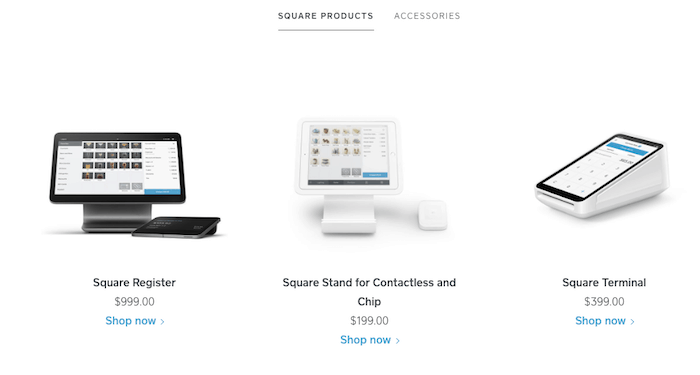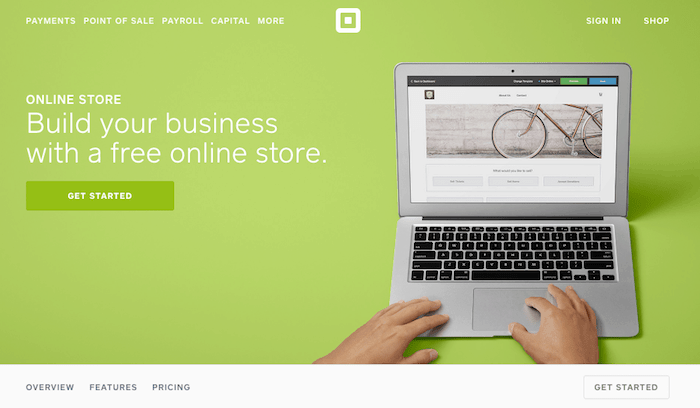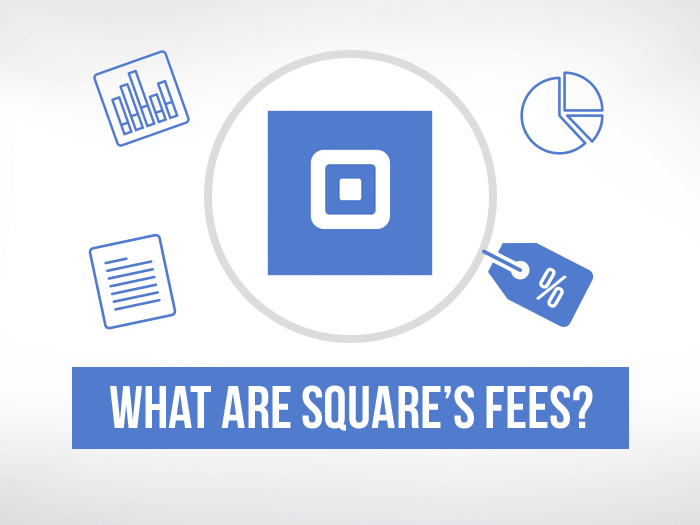Tooltester is supported by readers like yourself. We may earn an affiliate commission when you purchase through our links, which enables us to offer our research for free.
Square is a publicly traded company. If you had bought their shares when they first joined the stock market in 2015, they would have cost you $12 each. Three years later, you could have sold them for close to $100 each.
The point is, Square is growing, that’s also the reason why they recently acquired Weebly, one of our favorite website builders. Their success comes thanks to their simple fee structure, and making card payments easier for businesses of all sizes.
Square fees summary
Square takes 2.75% of every transaction. The fee is the same for all cards and business types. Payments without cards present (e.g. over the phone) cost 3.5% + 15¢. Square Register and Square Terminal have lower fees (2.6% + 10¢).
But are their prices really that straightforward?
This might have been the case at the beginning. Since then, they have added so many services and ways to accept payments that it can be a bit of a minefield.
This is why I’ve written this complete guide to Square fees, including information on all their services, pros and cons, and some good alternatives.
Pros and Cons of Square
Pros:
- Competitive rates
- Accepts all card types
- No extra fees or hidden fees
Cons:
- Not the best customer service
- Funds sometimes frozen while they investigate potential fraud
What is Square and How Does it Work?
Standard card payments are complex. The typical chain goes something like this:
- You, the consumer, select a card for your payment
- The store owner (merchant) processes your card through their system
- Card data is sent to an acquirer (or gateway for online payments). This is the merchant’s bank. They charge a fee for that.
- Data is sent from the bank to the right payment brand (Visa, Mastercard, etc…). They also charge a fee for that.
- Payment brand forwards data to the issuing bank (your bank)
- Then the whole cycle is repeated in reverse so everyone can check the payment information is valid.
Square is a third-party payments processor. It’s also called an aggregator. This means they do not process payments themselves. They appear at step #3 of the list above, and collect the credit card information from all their merchants. They then send them via one route only.
The key takeaway? In theory, Square’s “strength in numbers” approach can help reduce payment processing fees, by bundling bank charges and credit card charges into their own fees.
While this is good for having a clear fee structure, it also means fraudulent payments take longer to investigate. This is why funds are sometimes held up for a while, and sadly their customer service isn’t always there to help clarify what is happening.
How Does Square Process Card Payments?
If it’s online, it acts as a third party option you give customers at checkout. For POS (point of sale), you’ll need:
- The Square app on a smartphone or tablet
- A card reader

There are four types of card readers available.
- The standard magstripe reader: it’s a phone or tablet accessory that you plug in through the headphone jack or via lightning cable. You can then swipe cards through it. It’s free when you sign up. Extra readers costs $10 each.
- The new chip reader: it’s a bit more expensive, at $49
- Square Register: a neat, two-screens countertop register (new price: $799)
- Square Terminal: a small, standalone card reader ($299)
What About Their Other Square Services Pricing?
At the time of writing, there is also:
- Square Appointments: an extra app that lets you take bookings, sync them to a calendar, and process payments. Free for individuals. $50 per month for 2-5 users or $90 / month for 6-10 users
- Square for Retail: a special version of the app tailored for retail stores. $60 per month, per location.
- Square for Restaurants: same as above, but for restaurants. $60 per month, per location.
- Square Payroll: to process employee payments
- Square Invoices: to create, send and receive invoice payments
- Square Capital: allowing merchants to receive a cash advance and to pay it back via card transaction fees.
- Square Cash: like Square’s own version of ApplePay.
There’s a lot going on. I’ll only focus on the card-processing services in this article.
What Fees are Included with Square?
Let’s start with the good news. When you use Square, you will not have to pay for:
- Their app
- Setting up and signing up
- Square Magstripe reader (that connects to a phone or tablet through the audio jack)
- Monthly fees (a.k.a. statement fees)
- Gateway setup (banks charge a fee for the privilege of charging you for each transaction later)
- Monthly gateway fees (for instance these cost $30 with PayPal Payments Pro)
- Annual fees
- Minimum monthly processing fees ($70 with PayAnywhere if you process under $5,000 per month)
- PCI compliance for security (around $20 per month)
- Account close or early termination fees ($100 – $500)
- Bank charges (1.51% + 10¢ for every Visa transaction)
- Credit card fees (0.11% + 0.185¢ for every Visa transaction)
- Dispute management (for fraudulent or disputed transactions, learn more here)
It’s also worth noting once more that Square charges the same fee for every credit card type, whether it’s Visa, Mastercard, American Express, etc.
Square Fees for In-Person Card Transactions
As previously mentioned, Square fees vary depending on how the credit card is processed in person.
| Swiped, dipped, touched contactless cards | Keyed transactions (card-non present, for e.g. over the phone) | |
|---|---|---|
| Square POS
(smartphone or tablet with card reader) |
2.75% | 3.5% + 15¢ |
| Square Register | 2.6% + 10¢ | 3.5% + 15¢ |
| Square Terminal | 2.6% + 10¢ | 3.5% + 15¢ |
| Square Appointments For individuals | 2.75% | 3.5% + 15¢ |
| Square Appointments For Teams | 2.5% + $0.10 | 3.5% + 15¢ |
| Square For Retail | 2.5% + $0.10 | 3.5% + 15¢ |
| Square For Restaurants: | 2.6% + 10¢ | 3.5% + 15¢ |
Note the higher fee for ‘card not present’ scenarios. It reflects an increased risk in potential fraud, which would cost Square money when they have to refund the payment.
Also, if you do the math, you’ll work out that Square POS fees are advantageous for merchants whose transactions are small on average ($5 – $15).
Merchants with larger average transaction ($40+) can benefit from using Square Terminal or Register.
Finally, don’t forget that the Terminal and Register offer advantageous Square rates, but you need to buy them at $399 and $999 respectively. Factor how long it would take you to repay them before you take the leap.
Square Fees for Ecommerce
This one’s easy. Whether you use Square for invoices, or Ecommerce transactions, the fee is 2.9% + 30¢.

Square also lets you create a basic Square Online Store. This is completely free, so pretty good if want everything to be integrated. Although I’ll say that there are better ecommerce website builder options out there.
Optional Square Fees and Services
Do you want to pay more? Sure you can!
- Faster fund deposit: usually it takes 48H. You can make it 24H if you pay an extra 1% on each transaction you processed.
- Signup assistance: this will add 10 to 15 cents on top of the standard card transaction costs.
Good Alternatives to Square
- Shopify: one of the world leaders in ecommerce has also taken the leap into brick-and-mortar shops with its point of sale hardware. Card transactions cost between 2.4% and 2.7%, but you also need a monthly Shopify subscription.
- PayPal Here: it’s not as good for in-person payments, but for ecommerce and online payments, you have some of the best integrations available.
- SumUp: a German company whose chip reader looks a lot like Square’s. The standard fee is 2.65%, so slightly cheaper.
- Intuit GoPayment: the card processing solution from the company who gave you Quickbooks. Their card processing fees are lower (2.4% + 25¢), but you pay a monthly $20 fee.
Key Takeaway for Square Processing Fees
Not surprisingly for a company started by Twitter CEO Jack Dorser, Square is all about gaining new users – and growing fast. That means zero friction when opening an account, and a simple fee structure that will appeal to those who want to start taking card payments immediately.
However, this means sacrificing cheaper card processing fees (if you do your research with other competitors), and better customer service (if you are happy to pay more with other companies).
Finally, if you’re focused mostly on ecommerce, it might be worth looking at our Shopify review and BigCommerce review, amongst others.
> More information about Square
We keep our content up to date
28 Aug 2019: New price for Square Register.
26 Apr 2019: Square retired the Chargeback Protection program. Their new program is called Dispute Management.
THE BEHIND THE SCENES OF THIS BLOG
This article has been written and researched following a precise methodology.
Our methodology
